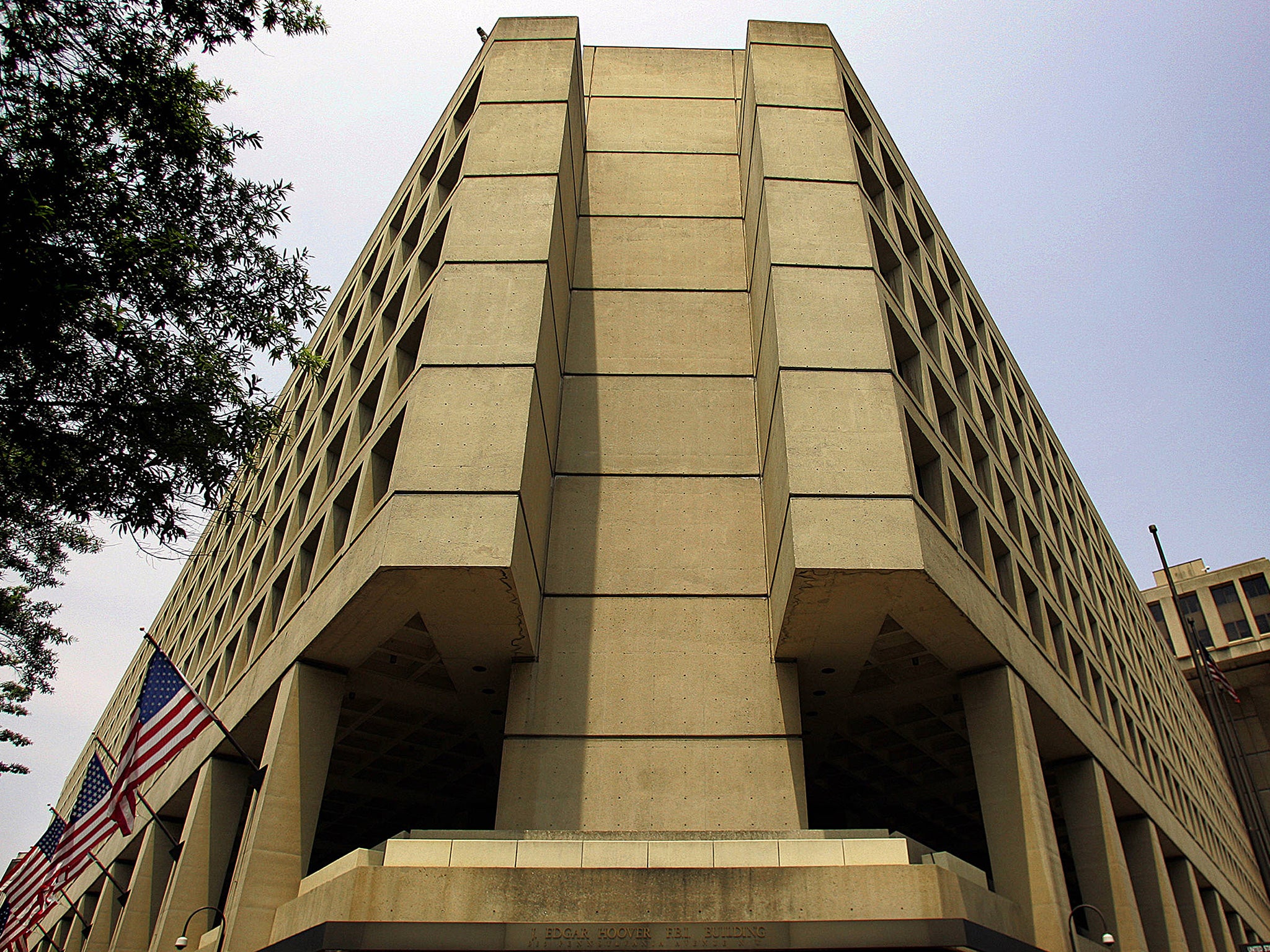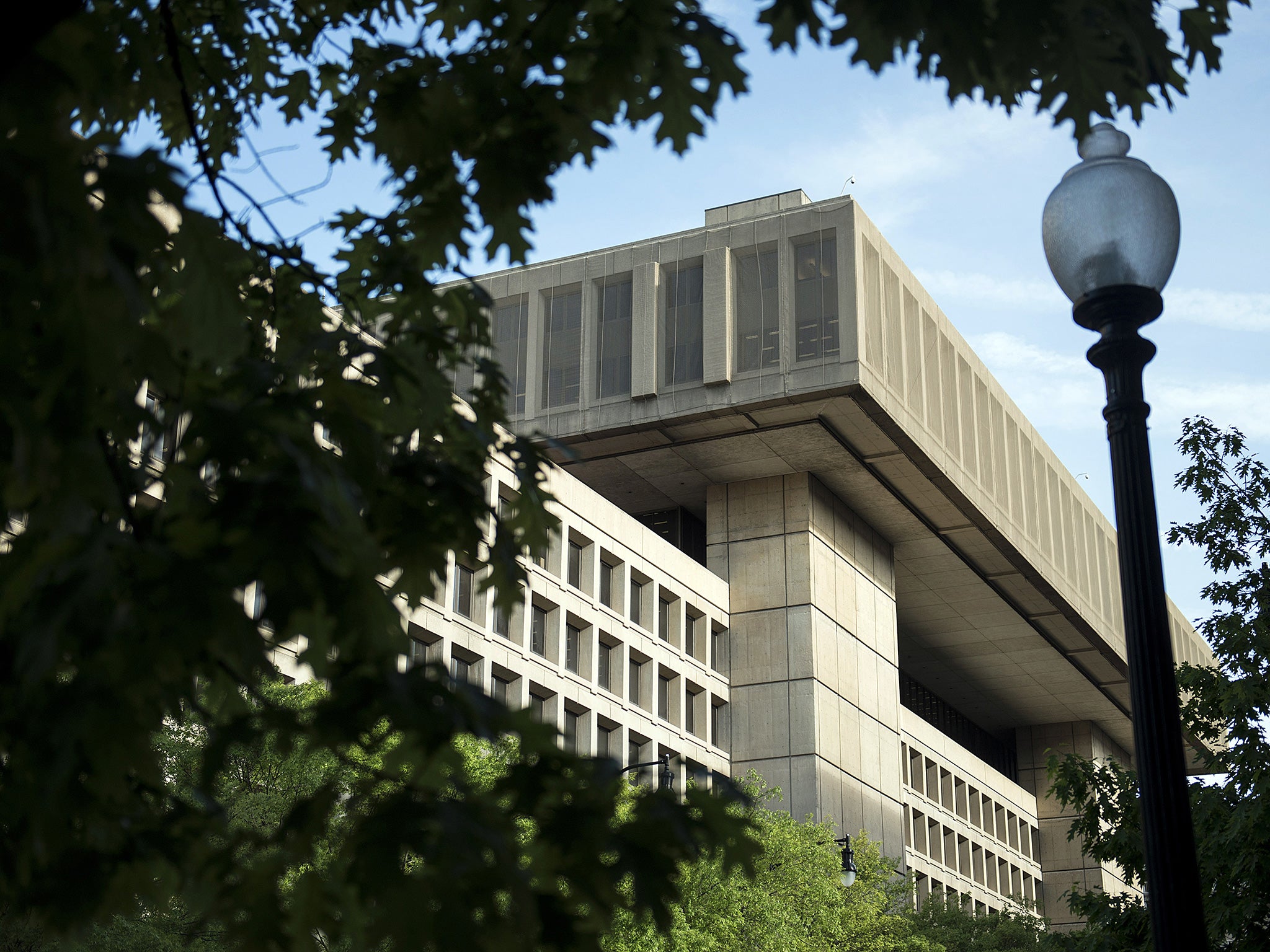J Edgar Hoover building: The FBI HQ is ugly, unloved and now falling to bits, but relocating it won’t be easy
Out of America: Its glowering bulk and windowless lower storeys evoke dark and sinister power, recalling the state within the state that Hoover created


Your support helps us to tell the story
This election is still a dead heat, according to most polls. In a fight with such wafer-thin margins, we need reporters on the ground talking to the people Trump and Harris are courting. Your support allows us to keep sending journalists to the story.
The Independent is trusted by 27 million Americans from across the entire political spectrum every month. Unlike many other quality news outlets, we choose not to lock you out of our reporting and analysis with paywalls. But quality journalism must still be paid for.
Help us keep bring these critical stories to light. Your support makes all the difference.
Try as they might, the world’s ugliest building just won’t go away. There are many contenders for that unwanted title, but the headquarters of the world’s most famous law enforcement agency in downtown Washington DC features on practically every list. And worse still, it’s now falling to pieces.
Pennsylvania Avenue is Washington’s equivalent of Whitehall. Broad and elegant, it runs from the edge of Georgetown through the ceremonial and monumental heart of the city, slicing past the Second Empire-style Old Executive Building, the White House and the Treasury. Lining the way are museums, the handsome former Central Post Office building and the DC federal courthouse, before it climbs up to the US Capitol, seat of Congress, and continues beyond towards Washington’s south-eastern suburbs.

But one concrete eyesore sticks out, at No 935. It’s the J Edgar Hoover Building that houses the FBI, named after the Bureau’s malign and paranoid first director, who was in the job for nearly 50 years and held presidents in his thrall. Built at a cost of $126m – then a record for a government building and twice the original estimate (what else is new?) – the FBI headquarters opened in 1974. The Brutalist-style structure might be less jarring if this were a city of skyscrapers. But skyscrapers are banned in downtown DC. Grace, harmony and vista are what make architectural Washington, and the FBI building offends on every count.
Now Brutalism isn’t all bad. Don’t be put off by the name; it has less to do with Caligula than champagne. Think unadorned or unrefined, brut as in Moet Chandon or Bollinger. Fifty years ago, the style was the fashion here, befitting the strong and self-confident government that believed it would create the Great Society. Even now the city still has some very decent specimens of Brutalism, not least the DC Metro, with its stations and their majestic vaults of poured concrete.
Alas, the FBI headquarters is not among them. Almost from the start it drew criticism. In 2006, the American Institute of Architects (AIA) described it as the “swaggering bully of the neighbourhood … Ungainly and ill-mannered.” Its glowering bulk and windowless lower storeys evoke dark and sinister power, recalling the state within the state that Hoover created, now metastasised into the surveillance state of the terrorist age. All this in the heart of the capital of the country that regards itself as a global beacon of openness and democracy.
It wasn’t meant to be that way. The building was designed to be open, with a courtyard where office workers could drop by and eat lunch. You could watch agents taking shooting practice. There was a museum displaying the triumphs of the FBI and its direct forebear the Bureau of Investigation, of which J Edgar became boss in 1924.
The 1995 Oklahoma City bombing and the 2001 attacks changed everything. Public tours stopped for security reasons. You can still visit the FBI Educational Center, successor to the museum at the Hoover building, but only by applying through the office of your Congressman, and undergoing vetting that can take three weeks.
In the meantime, the place has been coming apart at the seams – literally. The same year the AIA delivered its damning verdict, a chunk of the concrete façade broke off and crashed to the pavement in Pennsylvania Avenue. Netting has been put up to prevent a repeat. Outside, giant concrete flower pots act as security barriers, but the money isn’t there to plant them. Inside is no better. A Washington Post reporter who was recently permitted a visit wrote of cracked ceilings, work stations jammed into odd corners, and an air of decrepitude.

For a decade now, the Bureau has been saying, ever more urgently, that it needs a new headquarters, warning that the shortcomings of the present one – designed in an age when mobsters and anti-Vietnam subversives were its prime targets – are starting to interfere with the FBI’s paramount mission, of keeping the United States safe in a world of terrorists and cyberthreats that require instant action.
On this, everyone agrees, and every now and then there’s a spurt of activity. A couple of years ago Donald Trump, no less, expressed interest in redeveloping the Bureau’s headquarters. Right now of course he has other things on his mind. Trump though is converting the Old Post Office building across the street into a swanky hotel: “The Largest Luxury Hotel in Washington” proclaim giant T-R-U-M-P billboards, ahead of its 2016 opening.
Instead, the saga has become a case history in how Washington doesn’t work, from the obstacle course of planning policy and bureaucratic procedures to Congressional wrangling over money. On top of that there’s a predictable row over what the building should be called. A Democratic Congressman has introduced a Bill that would remove Hoover’s name, arguing that a persecutor of blacks, minorities and homosexuals has no right to be so honoured. But the shade of J Edgar is the least of the FBI’s worries.
The existing structure could be renovated, at a cost of up to $1bn (£665m). But even then, given the limitations of space and height, it could only house half of FBI headquarters staff, whose number in the DC region has doubled since 9/11, forcing the Bureau to lease office space at 22 other locations across the capital area. But Congress has ordered that they all be brought together at a single site. So, move the FBI must, sooner or later.
The idea now is to sell off the Pennsylvania Avenue property (retaining a little space for a museum you could actually visit) and use the proceeds to build a new HQ. But even with the rocketing property prices of downtown DC, they probably wouldn’t cover more than a third of the cost of the new premises, even outside the city.
Three candidates have emerged, two in suburban Maryland and one in Virginia. But when will it happen? For the moment, the world’s ugliest building reigns, unloved but immutable.
Join our commenting forum
Join thought-provoking conversations, follow other Independent readers and see their replies
Comments